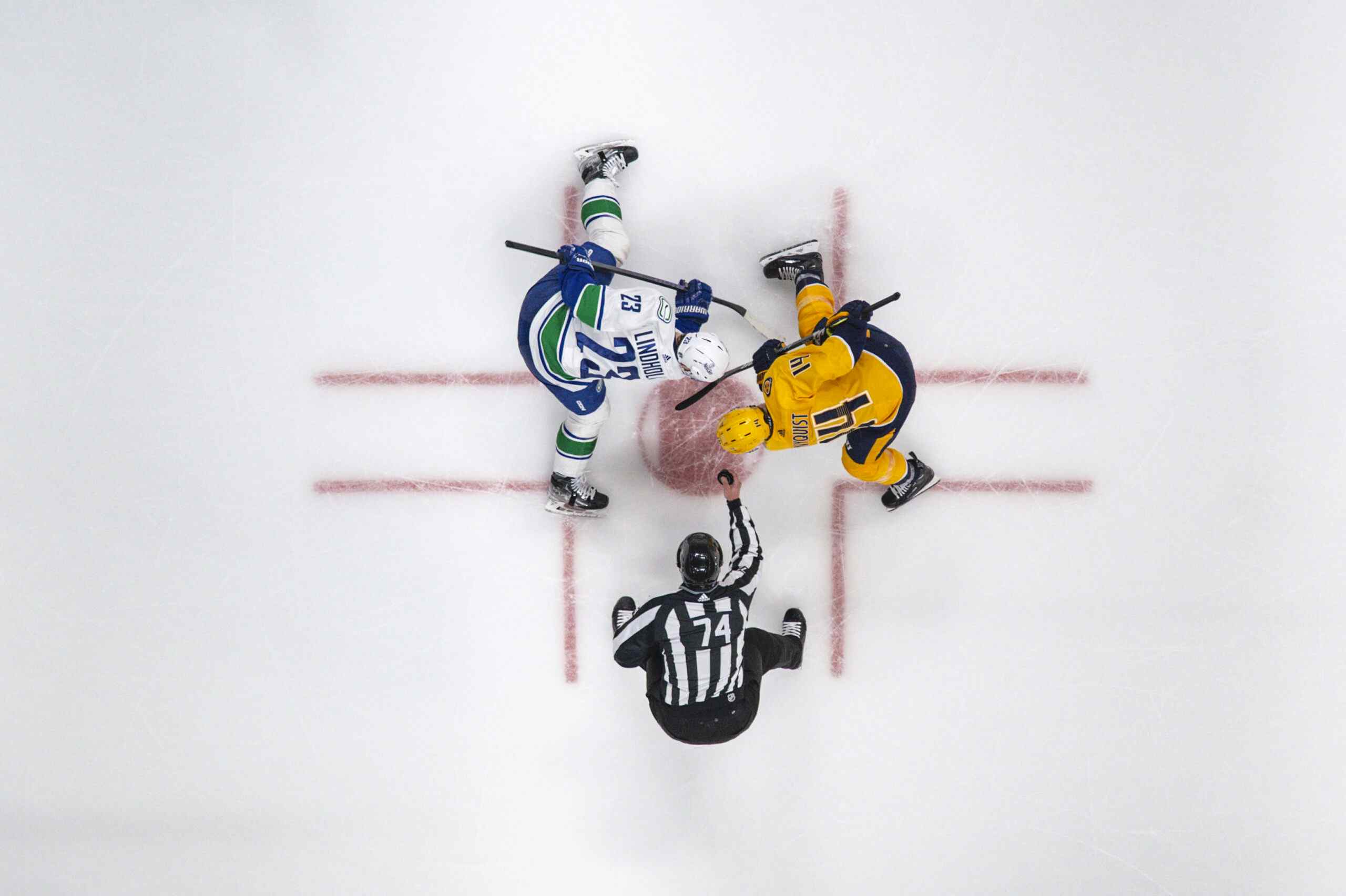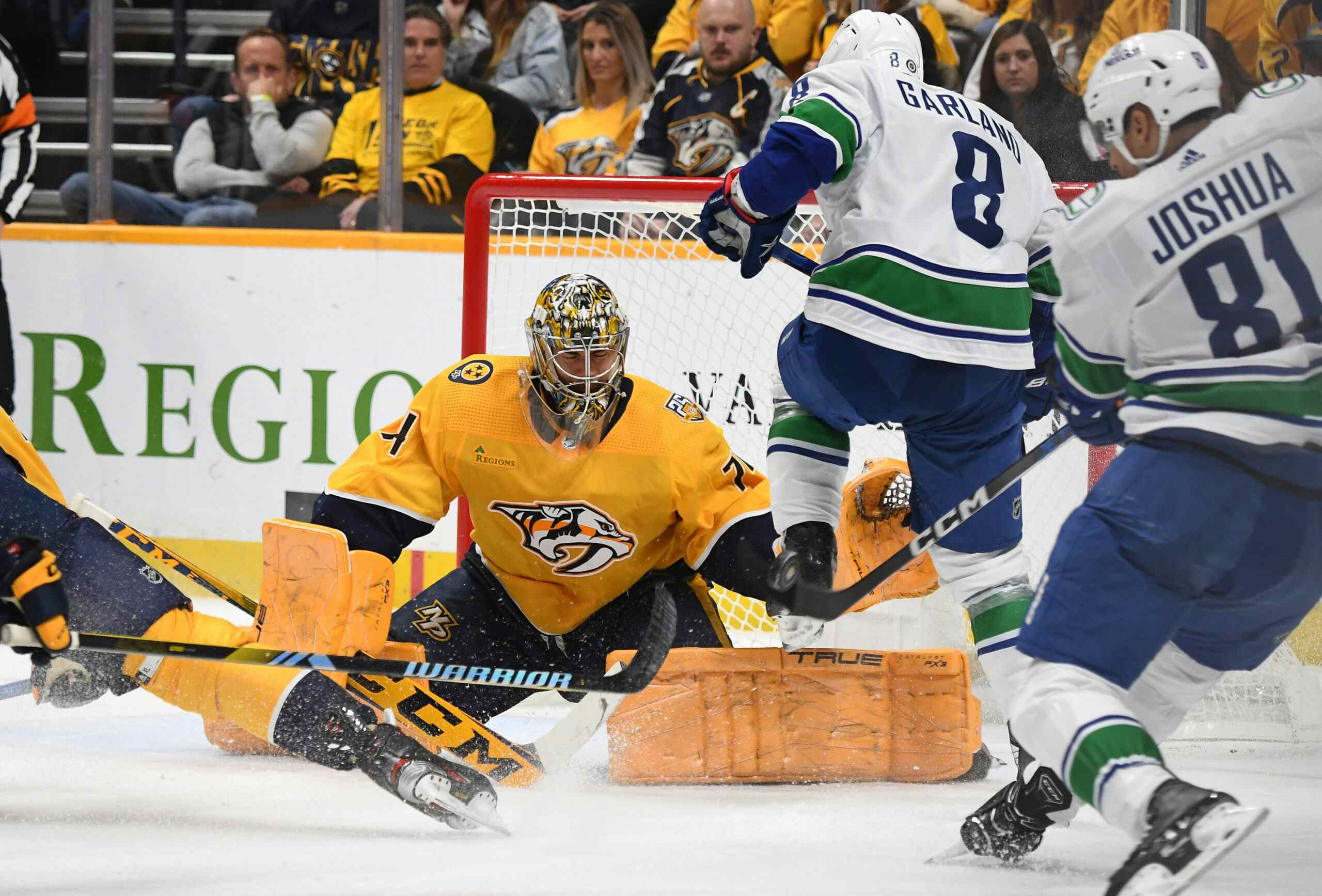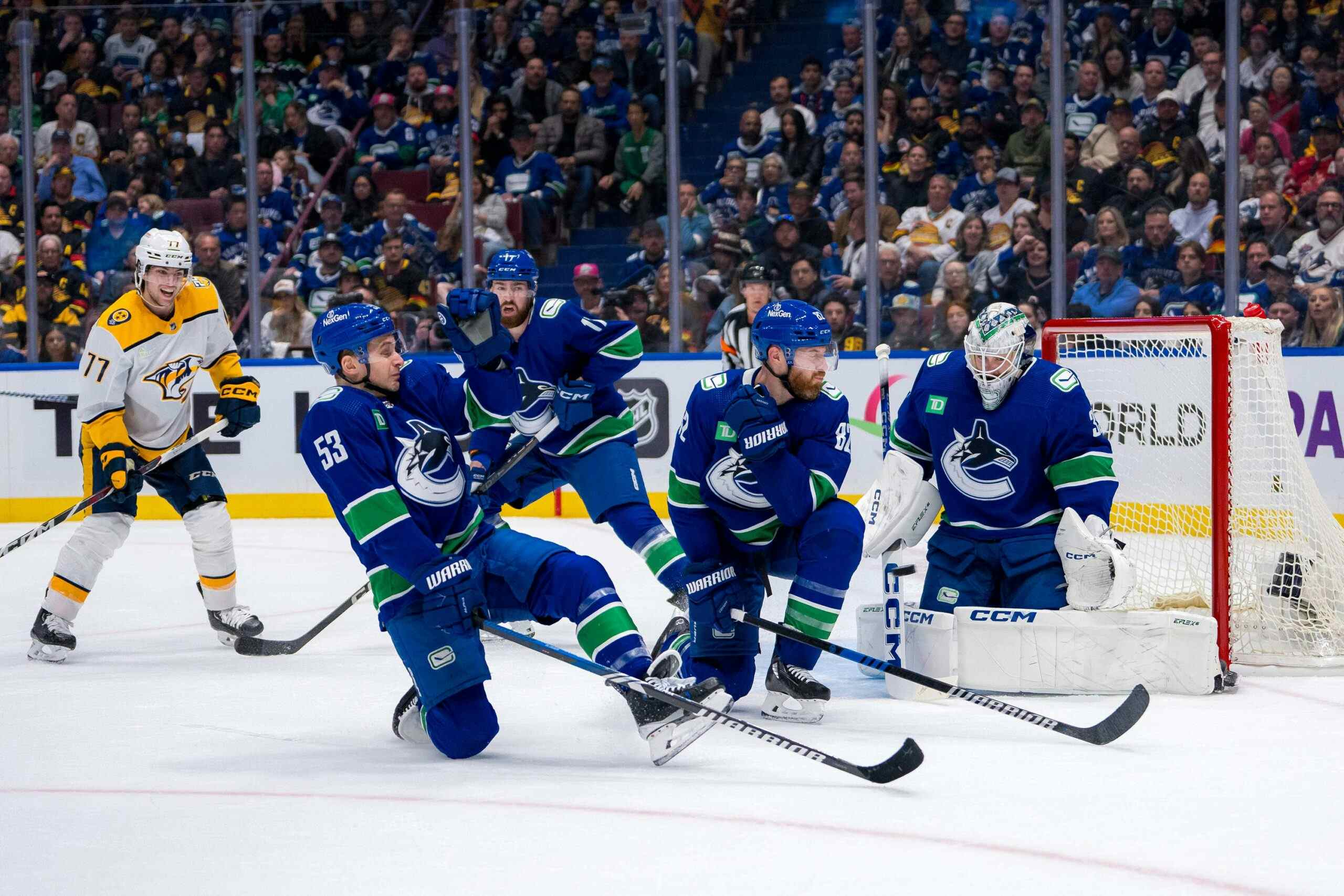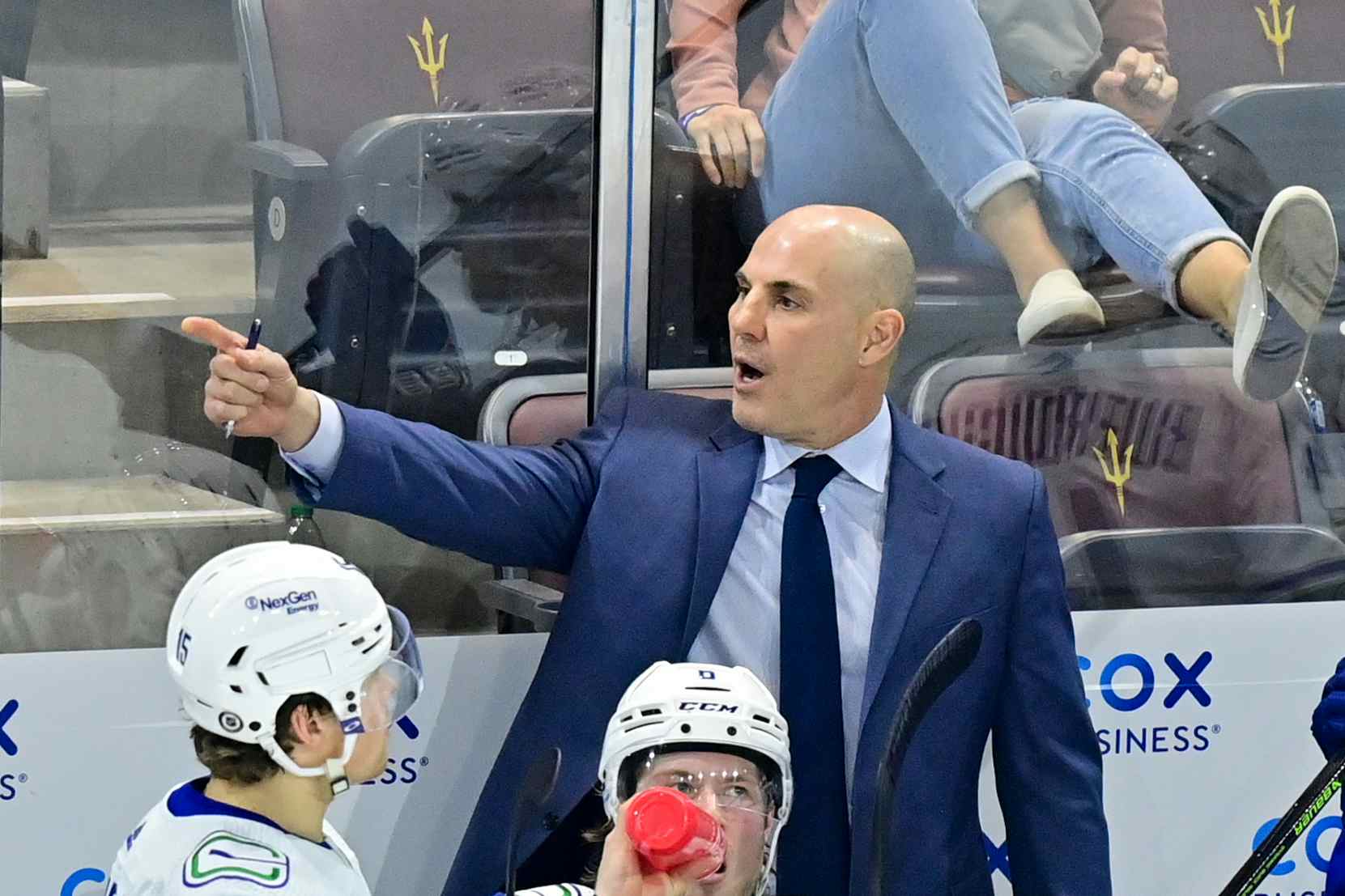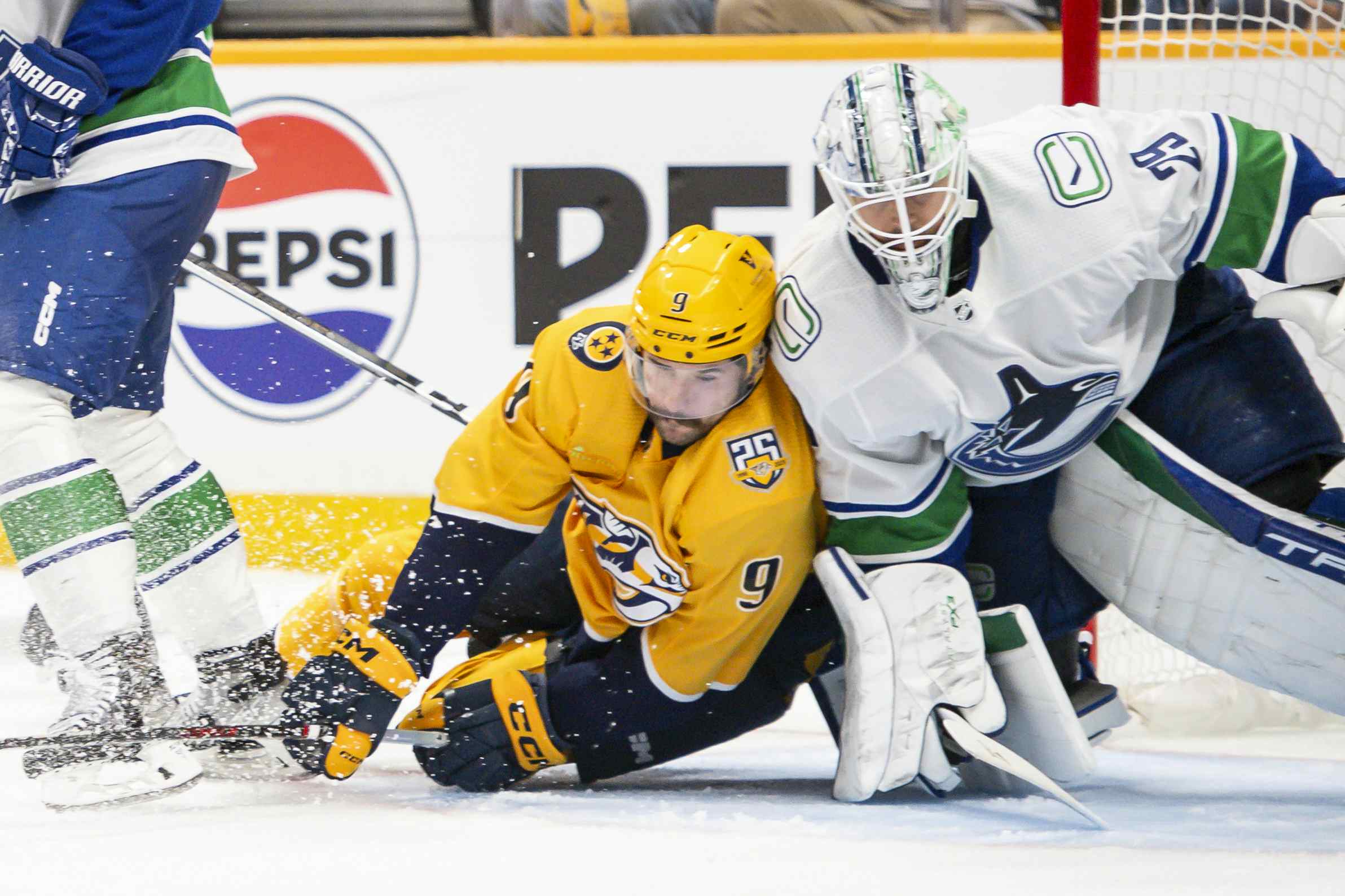Talking ‘Tenders With The Goalie Guild’s Justin Goldman

I have a fun little challenge for you – try discussing the Vancouver Canucks with someone, without the conversation eventually shifting over to the team’s goaltending situation. You can’t. It’s by no fault of your own. It’s the juiciest topic surrounding the team.
The Canucks currently have $9.33 million in cap space invested between the pipes, which puts them at the top of the league (technically the Bruins have $9.375 million devoted, but Tim Thomas’ days as a Bruin are over). Sure, it’s great having the best tandem in the league. But at that price it’s more a case of poor asset management than anything else.
You don’t have to be Sherlock Holmes – or even David Caruso for that matter – to figure out that it’s not a matter of if, but rather when a deal is made. It’s the one last trump card Mike Gillis has in his hand. The specifics of how he chooses to play it make all the difference in the world. And that’s why people will continue to talk about it, until it’s resolved.
With that in mind, I decided it was time to pick the great mind of Justin Goldman, from The Goalie Guild, in an attempt to make sense of the situation and get some answers. It turns out that he’s familiar with the goaltending position.
Click Past the Jump to Read the Discussion.<
Dimitri Filipovic: In case you thought I’d start off with a softball, that’s not how we operate around here. As of today, who do you think is the better goaltender – Cory Schneider or Roberto Luongo? Or more specifically, who would you rather have in net for you as you chased a Stanley Cup ring for one season and one season only?
Justin Goldman: I would rather have Schneider for a Stanley Cup run. I think he’s starting to reveal certain elements of his game in terms of attitude, work ethic and ability to battle that makes him the type of goalie that can steal a game, a series, or come up with the super-human effort in an overtime series-clinching playoff game. This is not to say that Luongo doesn’t have that capability, but if you’re asking me to choose, I’m taking Schneider.
DF: Can you imagine a scenario where the Canucks actually go into game 1 of the season (whenever that happens to be) with both guys on the team?
JG: To be honest, at this point, I think it’s almost more likely to happen. I have no idea what’s happening behind the scenes, but I think that the lockout has "gridlocked" the goalie scene. Luongo has a big contract, and there’s not a lot of movable parts out there. The longer the lockout goes, the tougher it will be for Gillis to move him, and another GM to acquire him. He might need to play in some regular season games again before there’s enough confidence for other GMs to consider trading for him. So at this point, I wouldn’t be surprised at all to see the Canucks begin the season with both of them. Better safe than sorry, I guess. And why not start the season with the best tandem in the league? Use the assets, while you still have them.
DF: What’s the most logical landing spot for Luongo, in your eyes? It’s no secret that he has his eyes on Florida, but with Markstrom being as highly touted as he is, and the team-friendly contracts of the Theodore/Clemmensen duo in place, I just don’t see it.
JG: Chicago and Florida make the most sense to me, but again, with the lockout muddying things up, teams that originally seem unlikely could be in the running down the line. New Jersey is an example – they desperately need a high-caliber goalie to replace Brodeur when he inevitably retires, which could be as soon as next summer. Luongo could be a quality replacement because he is experienced and knows how to handle the media pressure and high expectations. Injuries could also play a role in where Luongo eventually lands. A starting goalie for another team could get hurt, which would force their hand. But for right now, I think Chicago and Florida seem like the obvious ones.
DF: How much longer do you think Roberto Luongo realistically has as an elite goaltender in the NHL?
JG: I think he has at least two good years left in him, if not three. Again, there’s no way to know for sure because a lot will depend on where he’s traded to, and when. Some goalies age like fine wine, but ultimately there’s no real way to predict how or what that process entails. You just have to evaluate things as they happen. But I am confident in saying he’ll be a top-flight goalie for at least the next few seasons.
DF: Do you believe in the sophomore slump for goalies? I wrote about it this summer, and I basically debunked it with statistical evidence from recent years. It seems like it’s far more of a narrative derived by the media than anything else.
JG: Yes, I believe in the sophomore slump. No matter how hard you try, statistical evidence will never be able to fully prove whether it exists or not. Goaltending is not simple enough to quantify with stats that reflect past events. From my perspective, the sophomore slump is very real because it is mostly tied to the mental component, and goaltending is 90-percent mental. Trying to be successful as a sophomore is tied to their confidence, their approach, their maturity, and how they’re seen in the eyes of their opponents. You can read my thoughts on the sophomore slump here.
Every goalie goes through specific and unique mental, and physical hurdles that make it much tougher to be successful as a sophomore. Some goalies are more mature than others, and can overcome those hurdles more quickly. But winning games and stopping pucks is almost always harder the second time around. The idea of the "Dynamic Entity" linked above is something very few goalies can avoid. The more a goalie plays at the NHL level, the more their strengths, weaknesses, traits, and mannerisms are exposed for the world to see. Shooters pick up on a goalie’s tendencies, as do opposing team scouts and coaches. You also have elements like higher expectations, heavier workloads, and many other elements that influence a second-year goalie that don’t influence a rookie.
There is nothing wrong with researching stats to back up your argument that disproves the sophomore slump, but in my world, no past stat can prove what could happen to goalies in the future. Every goalie’s path, performance, and situation is totally unique. Some goalies will fall victim to the sophomore slump, some will overcome it. But I do believe it does exist.
DF: How do you think Schneider will handle an expanded workload? I am on the record as saying that a shortened season would do wonders for his development. He’d be afforded the luxury of starting 45-50 games this year, before taking the final step and getting into the 60’s next season.
JG: Physically speaking, Schneider shouldn’t have a problem playing anywhere from 55-to-65 games. He’s an elite athlete and a hard-working guy that knows what it takes to stay committed to things such as nutrition and off-ice training. He has the AHL experience, too. Mentally speaking, it will always take a goalie a year or two to get comfortable being a workhorse starter at this level. Being successful in that role – especially in a market like Vancouver – doesn’t happen overnight. There will be growing pains. But ultimately, I think he’s the type of guy that can play up to 65 games without a problem.
DF: Let’s assume that Roberto Luongo is gone by the time the season starts. Would you be more comfortable seeing the Canucks bring in a veteran backup goaltender, or do you think that Eddie Lack is up for the task?
JG: I would be more comfortable if the Canucks acquired the veteran goalie to back up Schneider. Every team needs a reliable, no-nonsense, low-maintenance backup when the starter is inexperienced in their elevated role. Schneider is terrific, but he will go through the growing pains I mentioned above, so the Canucks need someone who knows how to come off the bench and play well when called up. They need someone who is unfazed by media pressure, and someone who would appreciate and respect the opportunity to mentor a young star. They need a Johan Hedberg, Ty Conklin, Chris Mason, or J.S. Giguere type of goaltender.
Eddie Lack will have his opportunities to prove he’s ready for the NHL full-time, but there’s no reason to rush him at his age. There’s no reason why he can’t spend another season carrying the Wolves and trying to win an AHL championship. His new two-year contract is perfectly set up for this.
DF: How do you feel about goaltender time-shares, like the one we saw developing towards the end of the season in Vancouver last year, and the one we saw in St.Louis all year long? Do you view it as a positive thing, where both guys are pushing each other to be better every day? Or do you think that teams are better off with clear cut ‘number 1’ goalies?
JG: Workloads should totally depend on the goalie tandem in question. Some situations call for a clear-cut #1 goalie, other situations call for two guys platooning and sharing starts. More importantly, I think the coaching staff need to create a competitive atmosphere where both goalies earn every single start they get. I like the 56-26 split a lot. I’m not a fan of situations where a goalie, no matter how good he is, plays more than 65 games. When that happens, I think they lack the energy and focus they may need down the road in a deep playoff run.
But some goalies also need to play more to be at their best, with the best examples being Ryan Miller, Jonas Hiller, and Antti Niemi. It really just depends on the team, the goalies, and how the guys perform as the season wears on. Pencil in a schedule, but never stick to it, and always be willing to give the backup some games. There’s how you uncover hidden gems, that’s how you keep the starter motivated, and that’s how you keep things competitive.

DF: What was your initial reaction to hearing about the Canucks bringing in Dan Cloutier as a ‘goaltending’ consultant? What does that job title even entail? I tweeted that anyone who had expressed an issue with it was overthinking things.
JG: It’s easy to ridicule a guy like Cloutier. The same thing applies for Chris Osgood. But that shouldn’t be the case. Anytime you have a guy with recent pro experience helping out minor league or junior-level prospects, it’s a positive thing. I’ve tracked the trend of teams hiring more goalie coaches for over three years now, and to not have two goalie coaches within an organization is to be way behind the times. The Canucks made a smart move here, in my opinion. If Cloutier doesn’t work out, they’ll find someone better to fill the role.
But the key is to establish the assistant goalie coach/consultant position, put someone in place, and give the goalies in Chicago and the juniors someone to work with from time-to-time. Teams also should have a goalie-specific scout, and I think that’s another trend you’ll see develop over the next 3-5 years. Regardless of whether you think Cloutier was a good goalie or not, it doesn’t matter – he has quality experience, he has faced adversity, and he can teach the young guys some very valuable lessons. Anyone who doesn’t like the move because they weren’t fans of his performance or style are clearly missing the point.
DF: Justin, thank you for taking the time to chat. It was a pleasure, and we’ll make sure to have you on the podcast sooner rather than later.
Recent articles from Dimitri Filipovic

